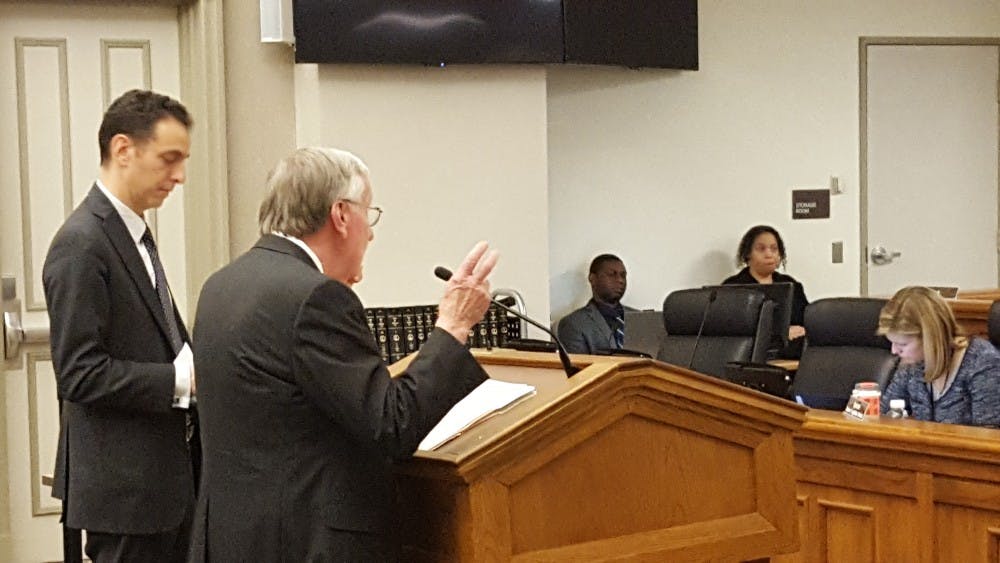Del. Ken Plum, D-Fairfax, and a dozen of his sharply dressed colleagues shuffled out of their seats and lined up behind a sign-in sheet. Plum put down his name and prepared to present his bill in the Virginia General Assembly to increase the Commonwealth's minimum wage.
Plum presented his argument to House Commerce and Labor Subcommittee No. 2 on Jan. 29.
“The current minimum wage was passed more than 10 years ago,” Plum said. “I want to bring it up to date.”
If enacted, Plum’s bill would raise the state minimum wage to $10.10 per hour, a notable increase from the current $7.25 standard.
“The purpose of this bill is not to raise the minimum wage,” Plum continued. “It is to ‘true up’ wages to reach the purchasing power they had.”
According to the U.S. Department of Labor, Virginia’s current minimum wage matches the federal standard, which was last increased in July 2009.
Economics professor Robert Dolan used the chain-weighted Consumer Price Index to calculate an unbiased estimate of inflation, and showed that $7.25 in 2009 had the purchasing power of about $8.47 today.
The Fair Labor Standards Act also stipulates that full-time college students may be paid 85 percent of the minimum wage, referred to as subminimum wage, for part-time retail or work-study jobs. This means that employers can pay students as little as $6.16 per hour.
However, University of Richmond pays at least $8 per hour for each of its 1,500 student employees with room for individual pay increases, Mike Pagano, assistant director of financial aid, said.
If minimum wage increased, then the subminimum wages for full-time students would rise to $8.59 per hour. But students may seek off-campus jobs paying upwards of $10 an hour.
Pagano does not consider this to be an issue.
“With the competitive wages and flexibility of being on campus,” Pagano said, “I don’t think we would have a problem. Supervisors here understand that first and foremost these are students, and that is the priority.”
Enjoy what you're reading?
Signup for our newsletter
Junior Emilie Erbland works four on-campus jobs this year and said she would not consider looking for off-campus jobs with higher pay.
“I have rapport with all of my employers,” Erbland said. “So I won’t be leaving.”
But the possibility of higher-paying jobs elsewhere tempted some students.
Sophomore Jack Crosby is a cashier on campus as well as a private tutor for Varsity Tutors.
“I work at ETC and Dean’s Den,” Crosby said. “It’s pretty relaxing, and it does have flexibility.”
If Plum’s bill goes into action, however, Crosby might consider working solely off campus.
“If the minimum wage were increased, then I would consider dropping it and going off campus or picking up another tutoring client,” he said.
But Virginia students may need to wait another year for a minimum wage increase, as Plum’s bill faced tremendous resistance during its reading.
Advocates from the Virginia Restaurant Association, the Virginia Retail Federation and the Virginia Chamber of Commerce spoke against the bill, stating that the wage changes would increase unemployment.
Dolan explained the advocates’ reasoning by defining labor demand elasticity.
“What determines the elasticity is the propensity for a business to replace its workers,” Dolan said. “How easy is it to replace workers with machines? Businesses might use more automation to adjust to the minimum wage. But regular restaurants cannot replace labor, so its effects will be felt in select industries.”
Before motioning a vote on the bill, Del. David Toscano, D-Charlottesville, made a final statement supporting it.
“We have been looking at this legislation for years,” Toscano said. “And every year we get the same arguments and the same cherry-picked studies. We have to start somewhere.”
The House Commerce and Labor Subcommittee No. 2 voted five to three along party lines to table Plum’s bill — effectually killing it unless a motion is made to revive it.
“On basic issues, it seems little has changed,” Plum said immediately following the vote. “But I’ll come back and work on broadening a coalition to make it happen.”
Contact contributor Daniel Williams at daniel.williams@richmond.edu.
Support independent student media
You can make a tax-deductible donation by clicking the button below, which takes you to our secure PayPal account. The page is set up to receive contributions in whatever amount you designate. We look forward to using the money we raise to further our mission of providing honest and accurate information to students, faculty, staff, alumni and others in the general public.
Donate Now



